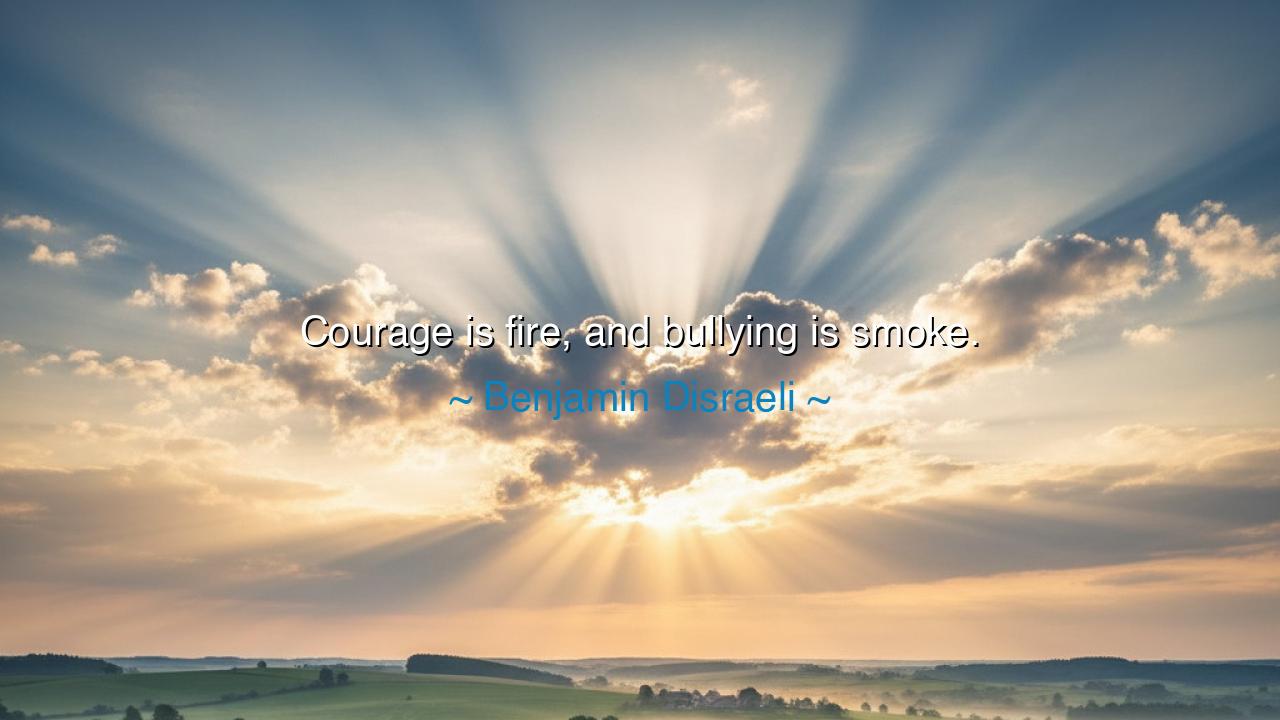
Courage is fire, and bullying is smoke.






“Courage is fire, and bullying is smoke.” Thus spoke Benjamin Disraeli, the great British statesman and writer, whose words burn with timeless wisdom. In this brief and vivid saying, he paints an image that captures the eternal struggle between true strength and false power. Fire — bright, life-giving, and pure — symbolizes the essence of courage, while smoke — dark, choking, and fleeting — embodies the spirit of bullying. Disraeli reminds us that courage is the living flame of the soul, born of conviction and honor, while bullying is only the shadow of fear pretending to be strong. One creates light; the other only obscures it.
In the heart of this quote lies a profound truth about human nature: the brave act to protect, the coward acts to control. True courage seeks no victims, for it is born of self-mastery. The bully, by contrast, is ruled by his own insecurity — his cruelty is not strength, but smoke rising from the fire of his weakness. Disraeli, who endured ridicule and prejudice throughout his career for being a Jewish-born outsider in British politics, knew firsthand the difference between courage and arrogance. He faced mockery in Parliament, yet met it with calm wit and intellect. His fire was steady — his courage rooted in dignity and endurance — while his detractors, though loud as thunder, left nothing behind but the ashes of their own malice.
The ancients, too, knew that true strength shines in restraint. The philosopher Seneca wrote that the greatest man is he who conquers his anger, for anger is a tyrant that enslaves the heart. So too is the bully a slave — enslaved to his own need for dominance. His power is hollow, his victories shallow. The courageous man, on the other hand, rules himself before he rules others. His courage is not born of hatred, but of principle. He stands firm not to crush, but to uphold what is right — his fire warms and enlightens, where the smoke of bullying blinds and chokes.
Consider the story of Winston Churchill, who, like Disraeli, faced both political scorn and personal doubt before leading Britain through its darkest hour. When the world trembled before tyranny, he stood steadfast — his words and spirit like a torch that refused to go out. Churchill’s courage was fire: it burned steadily through fear and despair, lighting the way for his nation. Meanwhile, the aggressors he opposed — loud in their threats and ruthless in their pride — were but smoke, their power vast but empty, destined to dissipate into nothingness. History itself bore witness: courage endures, but bullying fades.
The lesson that Disraeli offers is not only for kings and generals, but for every soul that walks among men. In every heart, there is both fire and smoke — the potential for courage, and the temptation toward cruelty. Each day we must choose which we will feed. The coward hides his fear by hurting others, while the courageous face their fear by rising above it. The coward demands obedience; the courageous inspire respect. One spreads confusion; the other spreads light. Therefore, the true measure of a person is not how loudly they assert themselves, but how calmly they endure, how honorably they act when power tempts them to arrogance.
There is also wisdom here for the age in which we live — an age of voices that shout, but seldom listen. Many mistake bullying for leadership, or loudness for conviction. But Disraeli’s fire teaches us otherwise: real courage is quiet but radiant, steadfast but humble. The one who can remain kind when provoked, patient when insulted, and strong when outnumbered — that one carries within them the fire that no wind can extinguish. Their strength uplifts rather than destroys; it clears the air rather than polluting it.
Therefore, my children, remember this eternal law: where there is smoke, there is weakness; where there is fire, there is truth. Nurture the fire within you — the courage to speak gently, to stand firmly, to protect the helpless, and to endure without bitterness. Let your strength be light, not shadow. When confronted by bullies — whether in life, in power, or within yourself — do not return smoke for smoke. Instead, let your courage burn brighter, for fire disperses smoke as truth disperses lies.
In this way, the wisdom of Benjamin Disraeli becomes both shield and torch for all generations. Courage is fire — it illuminates, purifies, and endures. Bullying is smoke — it darkens, corrupts, and vanishes. Choose, then, to be fire. For though smoke may rise swiftly and catch the eye, only fire has the power to warm the world and light the path of those who follow.






AAdministratorAdministrator
Welcome, honored guests. Please leave a comment, we will respond soon